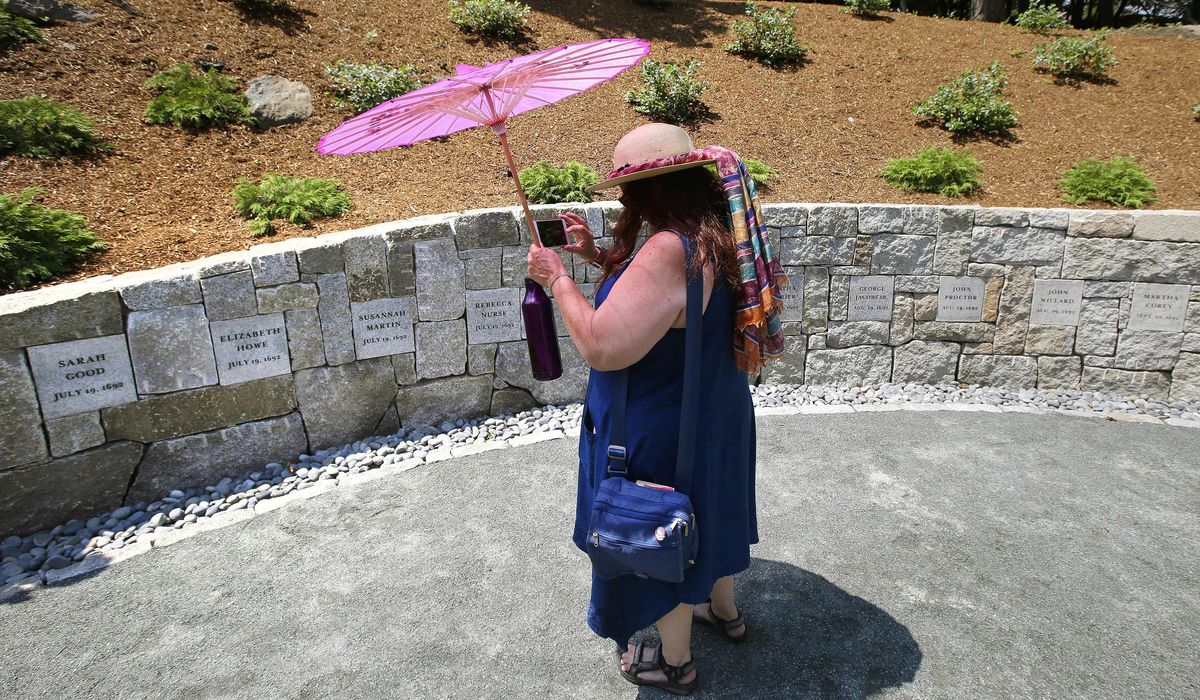
A Salem museum has opened an exhibit celebrating modern-day witch culture to dispel historical stigmas about witchcraft in the infamous Massachusetts town.
The Peabody Essex Museum’s exhibition “The Salem Witch Trials: Reckoning and Reclaiming,” running through March 20, features photographs of modern-day neo-pagans, occultists, herbalists, healers and Wiccan high priestesses, as well as sensual women’s fashion designs inspired by the 1692 execution of a presumed witch.
The museum’s website says that “Major Arcana: Portraits of Witches in America,” a series of 13 portraits by photographer Frances F. Denny, “reclaims the meaning of the word ‘witch’ from its historical use as a tool to silence and control women. Her portraits re-envision witchery by celebrating the spectrum of identities and spiritual practices found in today’s witch community.”
Two of the photographs depict pale young women dressed in black — one wearing a cape with a hunting bow, the other adorned by tattoos and a half-moon pendant as she forages for herbs. Other photos depict women in colorful Caribbean-style native dresses.
Authentic documents, artist statements and interviews accompany the photographs to reflect the modern-day experiences of “a multitude of voices” of women who share their personal histories and perspectives on witchcraft.
“A ‘witch’ is any woman who is grounded in her power, able to manipulate/shift energy for her highest good whether in the boardroom, the bedroom, or the kitchen,” Marie C. Nazon, a New York City-based witch also known as Mambo Yasezi, says in her exhibit text. “Any woman who uses the knowledge of the forces of nature to heal or consciously manifest, is a witch.”
Boston’s NPR radio station WBUR, which quoted this text in a Wednesday morning report on the exhibit, added that Ms. Nazon has a day job as “a licensed clinical social worker and a faculty counselor at The City College of New York.”
Ms. Nazon appears in the photograph with her daughter Ébun Zoule, a drummer for the band T-Rextasy who said in her exhibit text that witchcraft empowers her to fight capitalism.
“‘Witch’ is totally political for me,” Ms. Zoule’s text declares. “It is a political practice in that it allows folks to manifest things for themselves and their communities rather than relying on a capitalist system.”
The exhibit’s clothing designs come from the Fall/Winter 2007 collection “In Memory of Elizabeth How, 1692” by fashion designer Alexander McQueen, who based the series of slinky dark outfits on research into her July 1692 hanging on charges of witchcraft.
“McQueen’s work reclaims How’s power and memory from the false accusation that led to her unjust execution. He also mined historic symbols of witchcraft, paganism, religious persecution, and magic as potent inspiration for his fashion design,” the museum said in a statement.
According to WBUR, more than 200 people, mostly women, were accused of witchcraft during the 1692-93 Salem witch trials. The colonial justice system found 30 guilty and executed 20; another five died in prison.








